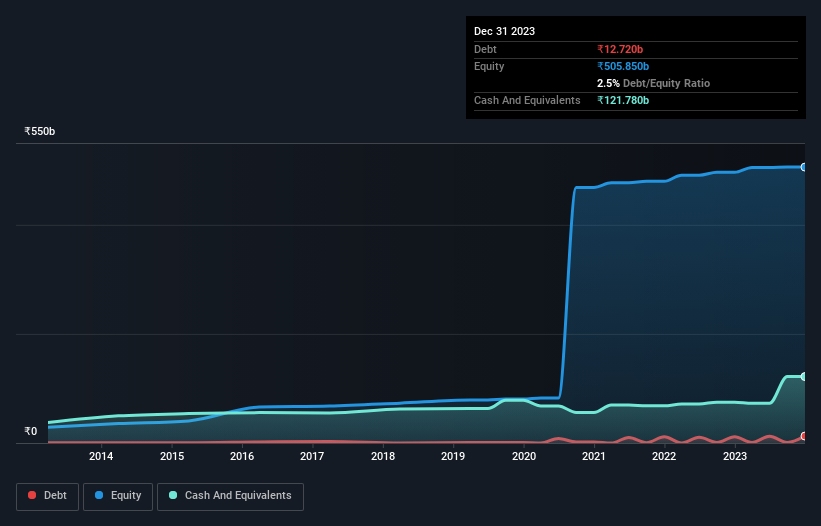
Warren Buffett famously said, 'Volatility is far from synonymous with risk.' So it might be obvious that you need to consider debt, when you think about how risky any given stock is, because too much debt can sink a company. As with many other companies Hindustan Unilever Limited (NSE:HINDUNILVR) makes use of debt. But the more important question is: how much risk is that debt creating?
When Is Debt A Problem?
Debt is a tool to help businesses grow, but if a business is incapable of paying off its lenders, then it exists at their mercy. If things get really bad, the lenders can take control of the business. While that is not too common, we often do see indebted companies permanently diluting shareholders because lenders force them to raise capital at a distressed price. Of course, plenty of companies use debt to fund growth, without any negative consequences. When we examine debt levels, we first consider both cash and debt levels, together.
Check out our latest analysis for Hindustan Unilever
How Much Debt Does Hindustan Unilever Carry?
The image below, which you can click on for greater detail, shows that at September 2023 Hindustan Unilever had debt of ₹12.7b, up from ₹11.4b in one year. However, its balance sheet shows it holds ₹121.8b in cash, so it actually has ₹109.1b net cash.

How Healthy Is Hindustan Unilever's Balance Sheet?
Zooming in on the latest balance sheet data, we can see that Hindustan Unilever had liabilities of ₹136.9b due within 12 months and liabilities of ₹135.6b due beyond that. Offsetting these obligations, it had cash of ₹121.8b as well as receivables valued at ₹32.4b due within 12 months. So its liabilities outweigh the sum of its cash and (near-term) receivables by ₹118.4b.
Since publicly traded Hindustan Unilever shares are worth a very impressive total of ₹5.30t, it seems unlikely that this level of liabilities would be a major threat. But there are sufficient liabilities that we would certainly recommend shareholders continue to monitor the balance sheet, going forward. Despite its noteworthy liabilities, Hindustan Unilever boasts net cash, so it's fair to say it does not have a heavy debt load!
The good news is that Hindustan Unilever has increased its EBIT by 5.9% over twelve months, which should ease any concerns about debt repayment. The balance sheet is clearly the area to focus on when you are analysing debt. But it is future earnings, more than anything, that will determine Hindustan Unilever's ability to maintain a healthy balance sheet going forward. So if you're focused on the future you can check out this free report showing analyst profit forecasts.
Finally, a business needs free cash flow to pay off debt; accounting profits just don't cut it. While Hindustan Unilever has net cash on its balance sheet, it's still worth taking a look at its ability to convert earnings before interest and tax (EBIT) to free cash flow, to help us understand how quickly it is building (or eroding) that cash balance. Over the last three years, Hindustan Unilever recorded free cash flow worth a fulsome 82% of its EBIT, which is stronger than we'd usually expect. That puts it in a very strong position to pay down debt.
Summing Up
We could understand if investors are concerned about Hindustan Unilever's liabilities, but we can be reassured by the fact it has has net cash of ₹109.1b. The cherry on top was that in converted 82% of that EBIT to free cash flow, bringing in ₹141b. So we don't think Hindustan Unilever's use of debt is risky. There's no doubt that we learn most about debt from the balance sheet. But ultimately, every company can contain risks that exist outside of the balance sheet. For example, we've discovered 1 warning sign for Hindustan Unilever that you should be aware of before investing here.
At the end of the day, it's often better to focus on companies that are free from net debt. You can access our special list of such companies (all with a track record of profit growth). It's free.
Valuation is complex, but we're here to simplify it.
Discover if Hindustan Unilever might be undervalued or overvalued with our detailed analysis, featuring fair value estimates, potential risks, dividends, insider trades, and its financial condition.
Access Free AnalysisHave feedback on this article? Concerned about the content? Get in touch with us directly. Alternatively, email editorial-team (at) simplywallst.com.
This article by Simply Wall St is general in nature. We provide commentary based on historical data and analyst forecasts only using an unbiased methodology and our articles are not intended to be financial advice. It does not constitute a recommendation to buy or sell any stock, and does not take account of your objectives, or your financial situation. We aim to bring you long-term focused analysis driven by fundamental data. Note that our analysis may not factor in the latest price-sensitive company announcements or qualitative material. Simply Wall St has no position in any stocks mentioned.
About NSEI:HINDUNILVR
Hindustan Unilever
A consumer good company, manufactures and sells food, home care, personal care, and refreshment products in India and internationally.
Excellent balance sheet with proven track record and pays a dividend.
Similar Companies
Market Insights
Community Narratives



